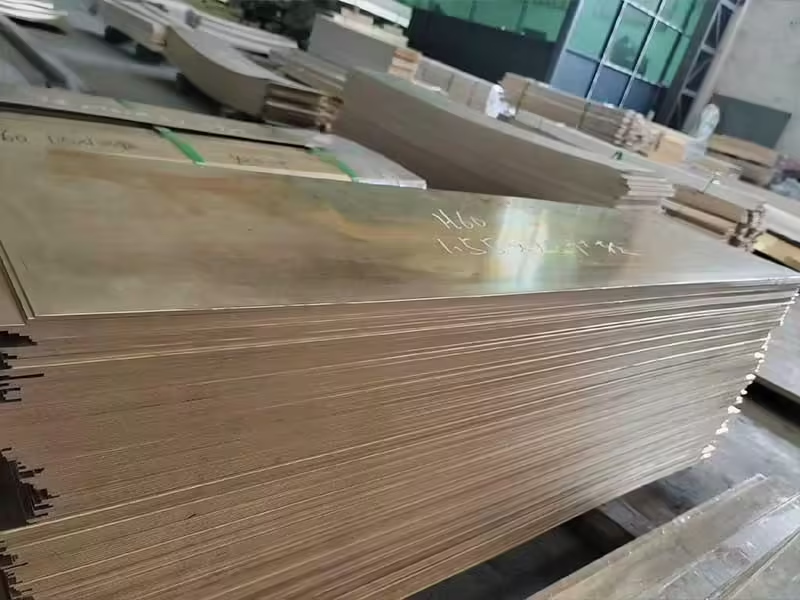Chào mừng đến với Blog của tôi!
Trước khi đi sâu vào nội dung, tôi rất muốn bạn tham gia cùng tôi trên các nền tảng truyền thông xã hội của tôi, nơi tôi chia sẻ thêm nhiều hiểu biết sâu sắc, tương tác với cộng đồng và đăng các bản cập nhật. Sau đây là cách bạn có thể kết nối với tôi:
Facebook:https://www.facebook.com/profile.php?id=61571539990739
Bây giờ, chúng ta hãy cùng nhau bắt đầu hành trình. Tôi hy vọng bạn thấy nội dung ở đây sâu sắc, hấp dẫn và có giá trị.
Mục lục
Giới thiệu

Pure copper plate is a fundamental material in various industrial applications, renowned for its exceptional electrical and thermal conductivity, corrosion resistance, and malleability. With a copper content typically exceeding 99.9%, pure copper plate serves as a critical component in sectors ranging from electrical engineering to architecture.
This article delves into the top industrial uses of pure copper plate, highlighting its significance and versatility in modern manufacturing and infrastructure.
Hiểu biết Pure Copper Plate
Pure copper plate is produced through a series of refining processes that eliminate impurities, resulting in a material with superior conductive properties. The high purity levels, often denoted by grades such as C11000 or C10200, ensure optimal performance in applications where conductivity and durability are paramount. The manufacturing process involves casting, rolling, and annealing, which contribute to the plate’s mechanical strength and workability.
Electrical Industry Applications
Conductors and Busbars
In the electrical industry, pure copper plate is extensively used to fabricate conductors and busbars. Its high electrical conductivity ensures minimal energy loss, making it ideal for power distribution systems. Busbars made from pure copper plate are integral in switchgear, panel boards, and substations, facilitating efficient current flow and heat dissipation.
Transformers and Motors
Pure copper plate is a preferred material for transformer windings and motor components. Its excellent conductivity and thermal properties enhance the efficiency and longevity of these devices. The use of pure copper plate in transformers ensures effective voltage regulation and energy transfer, while in motors, it contributes to improved performance and reduced energy consumption.
Bảng mạch in (PCB)
In electronics manufacturing, pure copper plate is utilized in the production of PCBs. The copper layers in PCBs serve as conductive pathways, enabling the flow of electrical signals between components. The purity of the copper ensures reliable signal transmission and minimizes resistance, which is crucial for high-performance electronic devices.
Thermal Management Solutions
Bộ trao đổi nhiệt
Pure copper plate is widely employed in the fabrication of heat exchangers due to its superior thermal conductivity. In industries such as HVAC, automotive, and power generation, copper-based heat exchangers efficiently transfer heat, enhancing system performance and energy efficiency.
Radiators and Cooling Systems
In automotive and industrial applications, pure copper plate is used to manufacture radiators and cooling systems. Its ability to rapidly dissipate heat makes it ideal for maintaining optimal operating temperatures in engines and machinery, thereby preventing overheating and extending equipment lifespan.
Heat Sinks
Electronic devices generate heat during operation, necessitating effective thermal management solutions. Pure copper plate is commonly used to produce heat sinks, which absorb and dissipate heat from components like CPUs and power transistors, ensuring stable performance and preventing thermal damage.
Architectural and Construction Uses
Mái nhà và ốp tường
In architecture, pure copper plate is valued for its aesthetic appeal and durability. It is used in roofing and cladding applications, offering a distinctive appearance that evolves over time due to the natural patination process. Additionally, copper’s resistance to corrosion and weathering ensures long-lasting protection for structures.
Decorative Elements
Pure copper plate is also employed in creating decorative architectural elements such as facades, domes, and interior accents. Its malleability allows for intricate designs, while its rich color and luster add visual interest to buildings and interiors.
Hệ thống ống nước
Copper’s antimicrobial properties and resistance to corrosion make pure copper plate a suitable material for plumbing systems. It is used to manufacture pipes and fittings that ensure safe and clean water distribution in residential and commercial buildings.
Transportation Industry Applications
Linh kiện ô tô
In the automotive industry, pure copper plate is used to produce various components, including radiators, brake lines, and electrical connectors. Its thermal and electrical properties contribute to vehicle efficiency and safety, while its durability ensures long-term performance.
Aerospace Engineering
Pure copper plate plays a role in aerospace engineering, where it is used in the fabrication of components that require high conductivity and resistance to extreme temperatures. Applications include electrical systems, heat exchangers, and structural elements in aircraft and spacecraft.
Railway Systems
Railway systems utilize pure copper plate in the construction of overhead contact lines and grounding systems. Its conductivity and mechanical strength ensure reliable power transmission and safety in rail operations.
Marine and Offshore Applications
Đóng tàu
In shipbuilding, pure copper plate is used to manufacture components such as hulls, propellers, and seawater piping systems. Its resistance to biofouling and corrosion in marine environments enhances vessel longevity and performance.
Nền tảng ngoài khơi
Offshore oil and gas platforms employ pure copper plate in electrical systems and heat exchangers. The material’s durability and resistance to harsh environmental conditions make it suitable for these demanding applications.
Submarine Cables
Pure copper plate is integral to the production of submarine cables used for telecommunications and power transmission. Its high conductivity ensures efficient signal and energy transfer over long distances under the sea.
Renewable Energy Sector

Tấm pin mặt trời
In solar energy systems, pure copper plate is used in the fabrication of photovoltaic cells and interconnects. Its conductivity facilitates efficient energy conversion and transmission, contributing to the overall effectiveness of solar panels.
Tua bin gió
Wind turbines utilize pure copper plate in generators and electrical systems. The material’s properties enhance the efficiency of energy generation and distribution in wind power applications.
Energy Storage Systems
Pure copper plate is employed in energy storage systems, such as batteries and capacitors, where it serves as a conductive material for electrodes and connectors. Its performance characteristics support the reliability and efficiency of these systems.
Thiết bị y tế và chăm sóc sức khỏe
Diagnostic Devices
Medical diagnostic devices, including MRI machines and CT scanners, incorporate pure copper plate in their components. Its conductivity and compatibility with imaging technologies ensure accurate and reliable diagnostic results.
Surgical Instruments
Pure copper plate is used in the manufacture of surgical instruments due to its antimicrobial properties and ease of sterilization. These characteristics help maintain hygiene standards in medical settings.
Hospital Infrastructure
In hospital infrastructure, pure copper plate is applied in touch surfaces like door handles and bed rails to reduce the spread of infections. Its antimicrobial nature contributes to a safer healthcare environment.
Industrial Machinery and Equipment
Electrical Discharge Machines (EDMs)
EDMs utilize pure copper plate as electrodes for precision machining processes. The material’s conductivity and wear resistance enable accurate and efficient material removal in manufacturing operations.
Welding Electrodes
Pure copper plate is used to produce welding electrodes, which conduct current to the welding arc. Its thermal and electrical properties ensure stable arc performance and high-quality welds.
Molds and Dies
In the production of molds and dies, pure copper plate is chosen for its thermal conductivity and machinability. These properties facilitate uniform cooling and precise shaping in molding processes.
Telecommunications Infrastructure
Signal Transmission Lines
Telecommunications infrastructure relies on pure copper plate for signal transmission lines and connectors. Its conductivity ensures minimal signal loss and high-speed data transfer in communication networks.
Antennas and Waveguides
Pure copper plate is used in the fabrication of antennas and waveguides, essential components for transmitting and receiving electromagnetic signals. The material’s properties support efficient signal propagation and reception.
Grounding Systems
Grounding systems in telecommunications facilities employ pure copper plate to provide safe pathways for electrical currents, protecting equipment and personnel from electrical faults.
So sánh của Pure Copper Plate Ứng dụng

To provide a comprehensive overview, the following table summarizes the key applications of pure copper plate across various industries:
| Ngành công nghiệp | Application Areas | Benefits of Pure Copper Plate |
|---|---|---|
| Electrical | Conductors, Busbars, Transformers, PCBs | High conductivity, thermal efficiency, durability |
| Quản lý nhiệt | Heat Exchangers, Radiators, Heat Sinks | Superior heat dissipation, energy efficiency |
| Architecture & Construction | Roofing, Cladding, Decorative Elements, Plumbing | Aesthetic appeal, corrosion resistance, antimicrobial properties |
| Vận tải | Automotive Components, Aerospace, Railway Systems | Conductivity, thermal management, structural integrity |
| Marine & Offshore | Shipbuilding, Offshore Platforms, Submarine Cables | Corrosion resistance, durability in harsh environments |
| Năng lượng tái tạo | Solar Panels, Wind Turbines, Energy Storage Systems | Efficient energy conversion, sustainability |
| Medical & Healthcare | Diagnostic Devices, Surgical Instruments, Infrastructure | Antimicrobial properties, reliability, safety |
| Máy móc công nghiệp | EDMs, Welding Electrodes, Molds and Dies | Precision, thermal management, machinability |
| Telecommunications | Signal Lines, Antennas, Grounding Systems | Signal integrity, conductivity, safety |
Phần kết luận
Pure copper plate is an indispensable material across a multitude of industries, offering unparalleled electrical and thermal conductivity, corrosion resistance, and versatility. Its applications span from critical infrastructure in power and telecommunications to essential components in medical and renewable energy systems.
As technology advances and the demand for efficient, reliable materials grows, pure copper plate will continue to play a pivotal role in driving innovation and supporting industrial development. If you would like to learn more, you can liên hệ với chúng tôi.
Câu hỏi thường gặp
What distinguishes pure copper plate from other copper products?
Pure copper plate typically contains over 99.9% copper, offering superior electrical and thermal conductivity compared to copper alloys. This high purity makes it ideal for applications requiring optimal performance and reliability.
How does pure copper plate contribute to energy efficiency in electrical systems?
Due to its excellent conductivity, pure copper plate minimizes energy losses during power transmission and distribution, enhancing the overall efficiency of electrical systems.
Is pure copper plate suitable for outdoor architectural applications?
Yes, pure copper plate is highly resistant to corrosion and weathering, making it suitable for outdoor applications such as roofing and cladding. Over time, it develops a protective patina that adds to its aesthetic appeal.
Can pure copper plate be recycled?
Absolutely. Pure copper plate is 100% recyclable without loss of properties, making it an environmentally sustainable choice for various applications.
What are the antimicrobial properties of pure copper plate?
Pure copper plate possesses natural antimicrobial properties, effectively killing a wide range of harmful microbes upon contact. This makes it valuable in healthcare settings for reducing the spread of infections.

